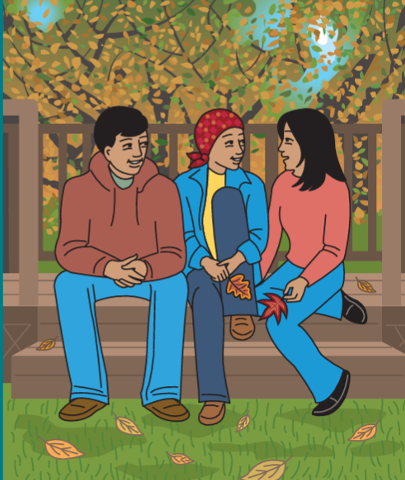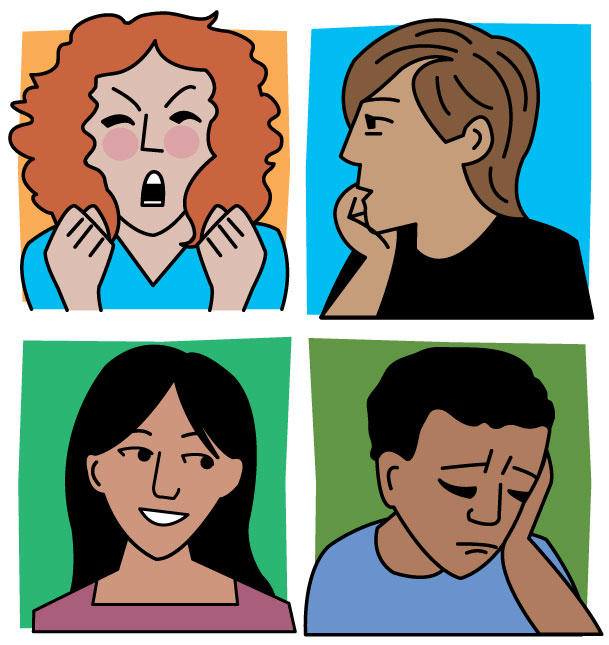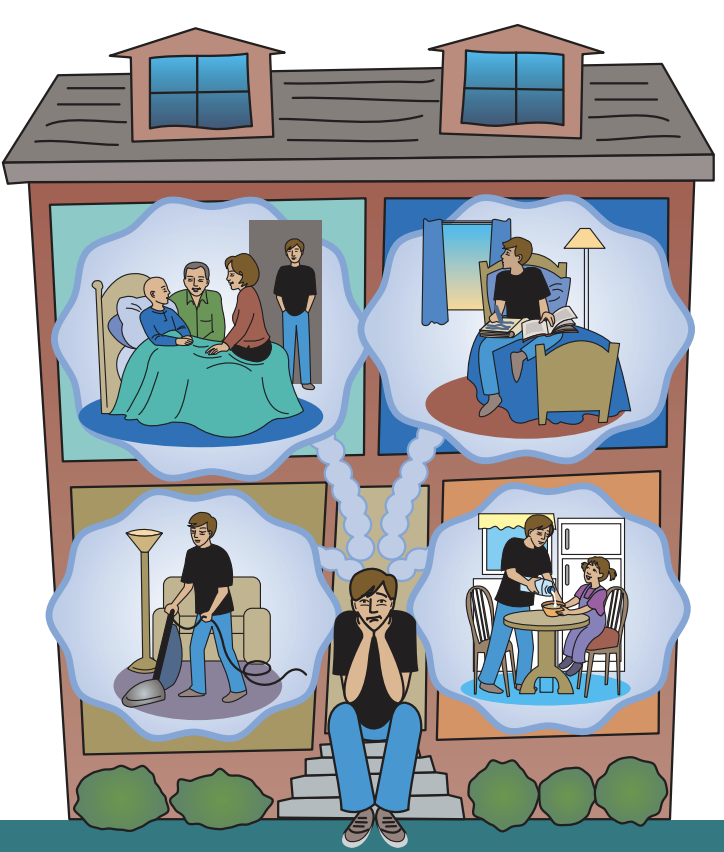For starters, consider the following:
- You can give and receive support. Although your parents may be focused on your brother or sister, it’s important to connect as a family. Learn about ways that families change and grow after a cancer diagnosis.
- Balance concern and fun. While concern and support for your sibling may be on your mind, it’s important to stay connected with friends and activities that are important to you.
- Ask for help if you feel alone. Try not to let difficult emotions build up. Talk with a parent, teacher, school counselor, or trusted adult. Learn about sibling support programs and get practical tips to care for yourself.
- Learn about cancer. Learning about cancer in children, especially the type of cancer your brother or sister has will be helpful. There are many different types of cancer and cancer treatments.
Your emotions and feelings when a sibling has cancer
When your brother or sister has cancer, you may have many difficult emotions. Some days will be good, and you may feel upbeat and happy. Other days will be hard. Different emotions will come and go, based on what you, your sibling, and your family are going through. Many siblings have these emotions:
- Shock: You may feel shocked and surprised to learn that your brother or sister has cancer. These are normal reactions.
- Scared: It’s common to feel afraid. Some fears may be real, while others may be based on things that won’t happen.
- Guilty: Some siblings feel guilty about taking a break or hanging out with friends. While this shows how much you care about your sibling, it’s both okay and important to do things that make you happy.
- Angry: Anger often covers up other emotions that are harder to show such as sadness, fear, or shame. Try not to let anger build up inside of you. Talking about anger can help you to release it. Being angry can cause you to say things you may regret.
- Neglected: Your family’s focus may change. Tell your parents how you feel and what you think may help. Remember that you are important and loved, even though you might not get as much attention.
- Lonely: When you feel isolated, let you family or trusted loved ones know how you feel. Reading or listening to podcasts or music may help.
- Embarrassed: It’s normal to feel uncomfortable if people stare or make remarks. Over time, you may be more comfortable and not notice or care so much.
- Anxious or stressed: If you feel anxious or stressed on most days, talk with a parent. Anxiety can make it difficult to do things that are important like getting a good night’s sleep, eating well, and concentrating.
Ways to deal with stress
You may not be used to talking about your feelings. Perhaps you think that if you ignore your feelings, they’ll go away. While this may help for a little while, holding in feelings can stop you from getting the help you need.
- Talk about what you are feeling: Talking with a friend or adult you trust can help. Over time some difficult emotions will lessen, and you’ll come up with solutions to others.
- Take life one day at a time: Try to focus on today, not what can happen in the future. Too much worry and stress can leave you feeling very tired. Try not to focus too much on things that you cannot control.
- Keep a journal: Write down thoughts, feelings, and events—even if it’s just a few words each day. Journaling can be a helpful way to process and work through difficult situations.
As you move forward, think about choices you have, conversations that might help, and things you can control. You may not be able to change every situation, but you can get better at choosing how they make you feel.
Looking back and seeing positives
Although it’s hard to imagine now, you can grow through this experience. Some teens said that having a sibling with cancer helped them to focus on what’s most important in life. Some found they had more compassion and empathy, a greater appreciation of little things, a closer relationship with their parents, an easier time talking about feelings, more maturity and self-awareness, and a greater ability to deal with difficult situations.
You and your family after a cancer diagnosis
You may be the oldest, youngest, or middle child in your family. You may live with one or both of your parents, or a family member. Whatever your family situation, chances are that things have changed since your brother or sister got sick. Here are ways to work through these changes.
Growing as a family
Families who grew closer say it happened because each person in the family:
- Made an effort: Tried to put themselves in another person’s situation and think about how the other person was feeling. Recognized challenges that others were having. Worked to put things in perspective and get through this tough time together.
- Recognized differences: Understood that even though people may react differently to situations, they were all hurting. Some people cry. Others show little emotion or use humor to cope. Talking about what helps you and others to cope can help.
- Kept talking: Asked others in the family how they were managing and talked about ways they could pull together as a family and help each other.
Taking on extra responsibility
The roles and responsibilities that people in your family had before your brother or sister got sick may change. Growing into new roles, and taking on extra work, can be tough for everyone.
Siblings whose brother or sister have cancer say they:
- are home alone more
- spend more time with relatives or at friends' houses
- do more chores around the house
- are falling behind at school
- wish someone would ask how they are doing and offer to help
If this feels like your situation, talk with your parents and suggest changes that you think may help.
Some teens say they try to be perfect, not cause trouble, and take on added responsibilities. You may do this to protect your parents, so they don’t have more to worry about. However, acting like everything is okay, when it’s not, can put up a wall between you and others. If you feel overwhelmed, discuss things you think could help with your parents.
Staying connected as a family
Talking can help your family stay connected, sort out challenges, and come up with solutions. Chances are that your siblings and parents are also having a tough time. Talk about how you are doing, how treatment is going for your sibling, and what to expect over the next few weeks. You may have a great relationship with your parents, or you may not. They may reach out to you, or you may need to reach out to them. Most likely, your parents want to help you but are having a difficult time themselves. When faced with tough situations, we all need extra support, especially from people we are close to.
Talking with your parents
Tips to talk and get the support you need:
- Reflect before you talk. Think about possible solutions you think could help with a problem or concern. Brainstorm with your parents on practical solutions that could help.
- Listen. Not all conversations are about fixing things. Some are just touching base, connecting, and listening. Sometimes talking about little things, such as how someone’s day was, can open up conversations about bigger things that are on each other’s minds.
- Take things slowly. Don't expect to resolve a situation right away. Difficult problems usually don't have quick and easy solutions. Some conversations will go better than others. Try to pause and respond, rather than react, to a situation. Think about answers to questions such as: What’s the real issue here? What’s really upsetting me? What can I do? What can others do? How can we figure it out together?
- Keep talking. Don't think you need to have big conversations. It’s often helpful to have many small ones. Try to connect a little each day, even if it's just for a few minutes.
- Be open. Talk with your parents about how much you want to know about your sibling’s health. Sometimes parents are well-intentioned but try to protect you. Other times parents may not have all the answers. Perhaps you could go to a doctor’s appointment with your sibling, to ask questions.
Having a routine
When so much is changing it helps to have a routine. Staying involved with people, and activities that are important to you, will help you to feel secure. The chance to focus on something fun for a few hours can lift your spirits. If getting to and from activities is challenging, maybe you can carpool with a friend. Talk as a family about the schedule for the week, including doctor’s visits and school events. Some families keep all this information on a calendar or board where everyone can see it and know what to expect for the week ahead.
You and your brother or sister with cancer
Whether your sibling is older or younger than you and whether you are close or not, you will be affected by their illness. Your brother or sister may feel afraid or sad. They may miss their friends. Sharing your thoughts and listening to theirs can help. Here are some suggestions to help get you started:
- Hang out together. Watch a movie, read, or play games together. Say, "I love you." Do what the two of you do best together.
- Share a laugh. You’ve probably heard that laughter is good medicine. Watch a comedy or read jokes together. Talk about things that make each other laugh.
- Bring up stuff that matters. Talk about tough times you’ve made it through in the past and about what is hardest for you both now.
- Be upbeat when you can but also keep it real. Being positive can be good for you both, but you don't have to be cheerful all the time, especially if that's not how you feel. Your sibling may be tired or scared. Try to be patient with each other.
- Call, text, and visit. Find ways to stay connected when your sibling is in the hospital.
Learning about cancer in children
Cancer is a group of diseases, not just one disease. There are many different types of childhood cancer. Each type of childhood cancer has different symptoms and prognoses. There are also many different treatments for children with cancer, such as chemotherapy, immunotherapy, radiation therapy, and surgery. You can learn more about childhood cancer and treatments in: When Your Brother or Sister Has Cancer: A Guide for Teens. Your parents can also check out this booklet: Children with Cancer: A Guide for Parents.
You and your friends
Your friends are important to you, and you are important to them. In the past, you could tell them everything.
Now that your sibling has cancer, it may seem like lots is changing, even your friendships. These tips may help:
- Reach out to help friends understand. It may be difficult for your friends to know what to say to you. They may not ask how you, or your sibling, is doing for fear of upsetting you. You may need to take the first step. Share only what you are comfortable talking about.
- Be open to new friendships. It may feel like your friends don’t care, or like their lives are moving on without you. Since they aren't facing the situation you are right now, it may be hard for them to relate. You may not have as much in common or you may grow apart. Be open to making new friendships. Get more ideas of what to say to friends in: When Your Brother or Sister Has Cancer: A Guide for Teens.
Tips to care for your mind and body
These tips can help you to cope and care for yourself. Caring for yourself isn’t selfish, it’s important.
Caring for your emotional health
Feeling worried or stressed, day after day, is a difficult way to live. Stress can affect your mind and body. It can put you in a bad mood, interfere with your concentration, and prevent you from thinking clearly, for example. Research has found that stress may even lower your immunity. Any way you look at it, too much stress isn’t good. Here are some ways to lower stress:
- Put your creative side to work: Draw, paint, or take photos. Make or listen to music. Garden or grow something. Taking up something creative can help you to relax and “let go” for a little while.
- Get inspired: Grab a book or watch an inspiring movie about someone who’s made it through a difficult time. Get inspired by what they achieved and who they became during this challenging time in their lives. Ask a teacher, coach, or librarian for book and movie recommendations.
- Grow your spiritual side: Difficult times can push you to ask difficult questions. Sometimes hardships can cause you to doubt or question what you believe. Often, faith grows. Talking with a religious leader, such as a youth pastor, may help. Try to focus on things you are grateful for, however small.
- Become a problem solver: Make a list of problems and difficulties. Then pick one or two and describe them in as much detail as possible. Think about details such as: What are specific things I can do to make this situation better? What choices do I have? Who could help me? What are some changes I can make?
- Learn relaxation techniques: Practices that help your mind and body relax are called mind-body exercises. They include biofeedback, deep breathing, guided imagery, hypnosis, meditation, and yoga, among others.
When it’s more than stress or sadness
While it’s normal to feel sad, if you no long enjoy activities you used to, and have this feeling every day for several weeks, you may have a more serious mental health condition. Depression is a common but serious mood disorder that affects how you think and feel and can interfere with daily living. Talk with your parents about getting mental health support if you have these problems on most days:
- no longer interested in your favorite activities
- losing interest in being with people
- feeling angry or hopeless
- sleeping a lot more or less than you used to
- thinking of hurting yourself or others
Caring for your physical health
Difficult times can affect you not only emotionally, but physically. Exercising can help. Research has found it can lower stress by helping to regulate hormones, such as adrenaline and cortisol. Physical activity releases endorphins, which are natural substances that lower pain and give you a feeling of well-being. However, if you get stomachaches or headaches, have difficulty sleeping, aren’t hungry, or notice other unusual symptoms, talk with your parent. Your parent can arrange for you to meet with your doctor.
Sibling programs and support
There are people in your neighborhood and family who may be able to help. National and community-based programs are also available to you, the sibling.
People in your family and community
Make a list of people who might be able to help, as well as things your family could use help with such as grocery shopping, meals, cleaning, and driving. Use it to ask for help. Check out organizations such as Caring Bridge, My Cancer Circle, and Cancer Support Community that provide or help coordinate support from others.
National programs for siblings
Here are some national organizations that offer sibling programs and resources:
- Alex’s Lemonade Stand has a program called SuperSibs which offers a comfort and care mailing program, a sibling ambassador program, and camps for siblings. They also have a “sib spot” for teens and younger children and a book with sibling experiences.
- Cancer Support Community lets you search for support groups, workshops, and events near you.
- CancerCare has information, resources, and support for siblings of children with cancer.
- American Cancer Society provides help to siblings of children diagnosed with cancer.
Hospital programs that serve brothers and sisters
Community organizations and hospitals also offer support groups for siblings; some meet online whereas others meet in person. There are social workers and nurses at hospitals that provide support to siblings such as the Sibling program at Dana-Farber Cancer Institute and Boston Children’s Hospital or the Support for Siblings at St. Jude Children’s Research Hospital. Call your local hospital or the hospital where your brother or sister is being treated and ask them to recommend programs, resources, or camps designed to help siblings.
Mental health professionals for children and young people
Sometimes talking with friends and your parents is not enough, or they are not there when you need them. It may help to meet with a mental health professional or a support group. Your parent may check with a school counselor or your insurance company for help finding a mental health expert. Meeting with a mental health professional means you have the courage to recognize that you are going through a tough time. These specialists (such as a psychologist or a psychiatrist or counselor) are trained to help people sort out difficult feelings and gain new skills. Talking with someone who is outside your circle of friends and family, and doesn’t take sides, can be very helpful.
These organizations offer free support and resources to young people:
- The National Alliance on Mental Illness (NAMI) has information for teens and young adults and access to a helpline. You can enter your state to find groups that meet online and in person. Call the free helpline at 1-800-950-NAMI or text “NAMI” to 741741.
- The Anxiety and Depression Association of America (ADAA) has a teen and college student section.
- The National Institute of Mental Health (NIMH) has helpful tips for you to care for your mental health.
Life after cancer treatment for families
After treatment, it will take time for your family to adjust. Keep these things in mind:
- Pull together as a family. Difficult times can bring out the best and worst in people. The stress that pulls some families apart brings other families closer. Staying together takes work. Keep trying.
- Discover your own needs. Don't let others tell you how you should feel. Allow yourself to cope and get back to what many people call a “new normal” at your own pace and in your own way.
- Ask for help. If you feel alone, reach out to family members, friends, neighbors, support groups, and counselors.
- Appreciate. You may have more compassion and may appreciate things you once took for granted. Take time to write down your thoughts, especially the things you struggled with that helped you to grow.
If treatment has worked well
After treatment, you and your family may feel many different emotions, just as you did when your brother or sister was first diagnosed. You may be glad that treatment was successful. However, you may also struggle with new routines and feel like life probably won’t get back to exactly how it was before. Getting back into the swing of things may take longer than expected and may not happen as you expect.
If treatment isn’t working
If treatment does not help your brother or sister to get better, you and your family will face more challenges.
When the future is uncertain, it helps to:
- Make the most of the time you have. Spend time with your brother or sister. Help care for your brother or sister if they are at home and call or visit if they are in the hospital.
- Stay on track. When you get bad news, it can feel like life is moving along without you. Stay involved in things that bring you joy. Keep believing in a better tomorrow.
- Get help. Find people who can support you, listen to you, and be there for you.
If your brother or sister dies, these suggestions may help get you started down this new path:
- Recognize your loss. When someone you are close to dies, it can feel like you are losing not only that person, but a part of yourself. It’s both okay and normal to feel really sad. Some people say it’s not something you “get over” but rather learn to carry and live with, over time.
- You will always have memories. Your brother or sister will always be part of your life. Hold on to your memories. It's okay to think about something funny that they did or said. By smiling, you bring back some of what was so special about your brother or sister.
- Pain lessens with time. At first, the pain may be so strong that you might wonder whether you will ever feel happy again. Yet time has a way of slowly healing. And when you find yourself not being sad every day, it doesn’t mean that you have forgotten. It means you are healing.
- Everyone grieves in their own way and time. You may grieve by crying, being quiet, and spending time alone. Or it may help to be around friends. For others, their faith helps them to grieve with hope. The amount of time spent grieving and healing is different for everyone.
- Keep a routine. Try to keep a routine, as much as possible. This can help get you back on track again.
- Life will change. Stay open to new experiences. Write down what you are feeling and processing. Life won't be the same, but it can be rich and full again. Keep believing this.
This experience is probably one of the toughest you’ll ever face. It will change your life. But you will get through it. You are strong, and you are capable, even if you don't always feel this way.



